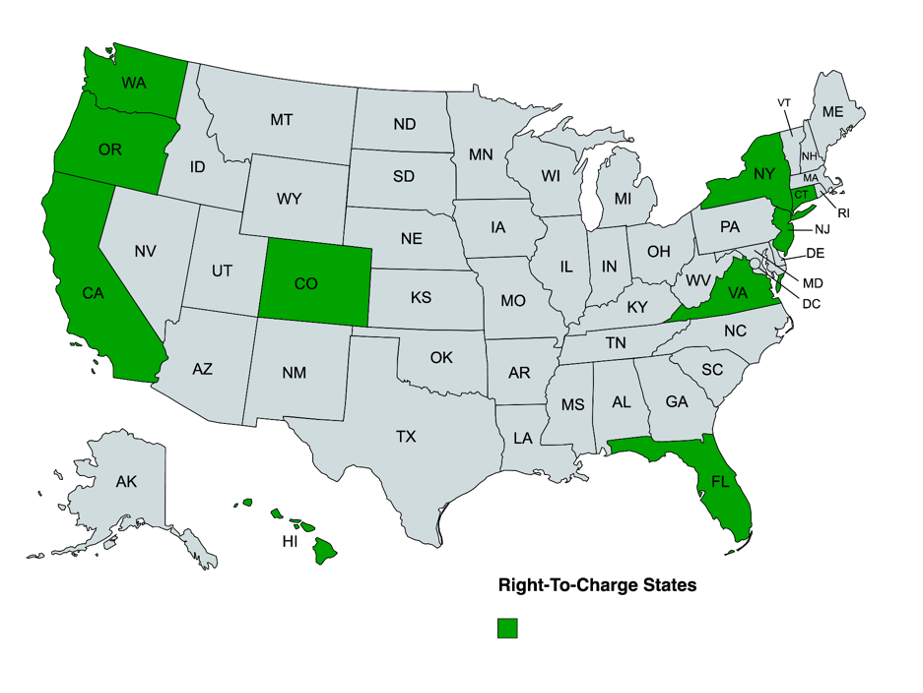The Problem
Availability of power for electric vehicle charging at home is one of the most important factors in driving affordable access to EVs for all Americans. However, not all EV users have designated off-street parking where they can charge their vehicles.
Homeowners in apartments, condominiums, and even single-family houses in developments are sometimes restricted by homeowners associations (HOAs) from installing EV chargers. Renters can have an even harder time accessing charging stations, since many leases and rental agreements prohibit material changes to property such as installing a charging station.
The Solution
Fortunately, several states have enacted policies designed to provide EV users without private parking access to affordable charging. These policies are typically known as right-to-charge policies and serve to ensure that residents in multifamily units have fewer barriers to installing charging infrastructure in parking garages and/or parking lots. While a step in the right direction, these policies can vary in their protection of unit owners and renters. Across the board, however, the recurring intent of these policies is that HOAs, or building owners / managers in the case of renters, should not create undue burdens on residents to prevent them from accessing charging in multifamily units. Of the nine states that have right-to-charge policies, only four (CA, CO, CT, and VA) extend protections to both renters and owners, while the remaining states have policy language that only focuses on protecting unit owners.
Plug In America supports and encourages right-to-charge policy adoption as an effective tool for the widest possible adoption of EVs. In order to ensure the most equitable access to charging, we encourage inclusive policy language such as:
- Protections for property renters in addition to owners
- Applying policies to various kinds of applicable communities, including co-ops, planned communities, townhouses (collectively known as common interest communities) in addition to condos; and apartments (when renter protections are included).
- Provisions that ensure that designated-space charging is connected to a unit’s electricity meter so as to ensure the greatest reliability and preserve consumer choice when choosing charging power levels (Level 1 or Level 2).
- Making relevant common space available for charging if unit-designated parking is not available.
Success Stories
We commend CA, CO, CT and VA for their progressive right-to-charge policies and encourage other states to adopt similar policies. We highlight the policies of these states below. For those states with less inclusive right-to-charge policies, we recommend that they broaden the scope of their policies to benefit the greatest number of prospective and current EV users, regardless of whether they are unit owners or renters.

Colorado
Colorado goes above and beyond in the delivery of its right-to-charge policies in several ways:
- Colorado is the only state to provide reason and climate-related context as to why the right-to-charge policy is important by stating that the widespread use of plug-in electric vehicles can dramatically improve energy efficiency and air quality for all of its citizens. The policy goes further to say that the adoption of EVs should be encouraged wherever possible.
- Many of the right-to-charge policies in each state achieve the bare minimum in that they are successful in reducing obstacles that may prohibit the installation or use of a charging station installed for property owners and/or renters. Colorado offers that the primary purpose of this policy is to not only reduce obstacles, but also to provide residents of common interest communities a “meaningful opportunity” to take advantage of the availability of plug-in electric vehicles.
- Colorado not only strives to make EV chargers accessible through strong policy language, it offers financial opportunities as well. Their policies encourage common interest communities to apply for grants from Colorado’s electric vehicle grant fund or fund the installation of charging stations on common property as an amenity for residents and guests.
California
- California has been a long time leader on right-to-charge issues, and in addition to protections for both renters and owners, also extends its policies to ensure that even if a renter / owner does not have a designated parking spot to add EV charging, that renters and owners should have access to common element (shared) parking spaces as available with which to install EV charging stations.
- California’s right-to-charge protections for owners in condos, co-ops and planned communities include language that, while not referencing climate like Colorado, does highlight that these protections are in line with state policy “to promote, encourage, and remove obstacles to the use of electric vehicle charging” writ large. This is to be commended.
Connecticut
The noteworthy elements that distinguish Connecticut’s right-to-charge policies include:
- Unit owners have the ability to install an EV charging station in a common space for the use of all unit owners, which is worthwhile in cases where there is limited to no designated parking space.
- If a parking space does not exist, an association of unit owners has the ability to create one for the purpose of installing an EV charging station. Notably, this can encourage cost-sharing for charging installation, recognizing that in some use cases, one charger might be sufficient for more than one renter/owner.
Virginia
- Virginia’s right-to-charge policies apply to both owners and renters in multi-family housing, including lot owners in common-interest communities.
Citations
California
Colorado
Connecticut
Florida
Hawaii
New Jersey
New York
Oregon
Virginia
Washington
Want to receive our Plug Into Policy monthly newsletter?
You can be the first to know when we publish new reports. Sign up in just a few seconds.